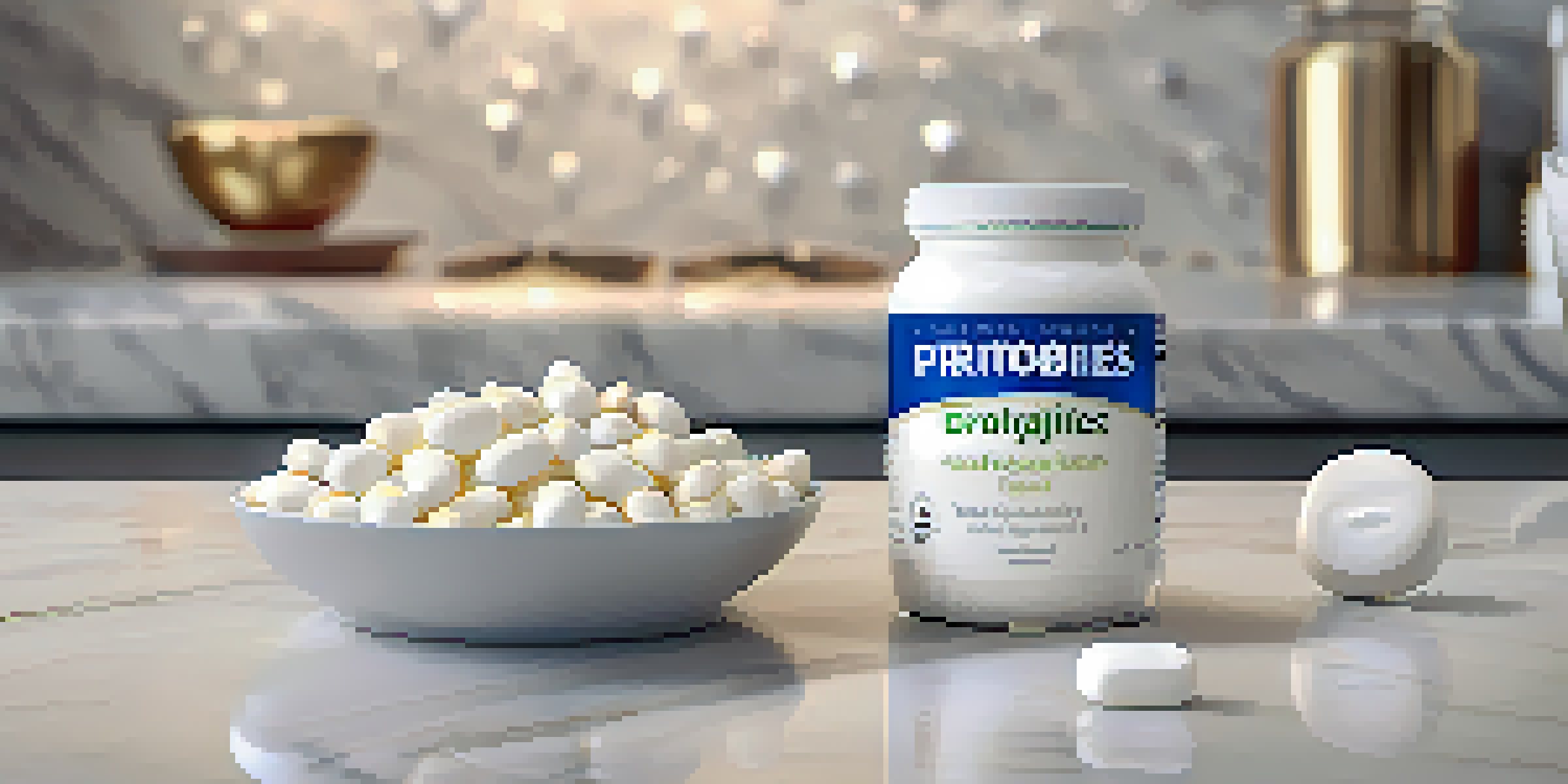The Role of Probiotics in Gut Health and Nutrition

What Are Probiotics and Their Importance?
Probiotics are live microorganisms that provide health benefits when consumed in adequate amounts. Often referred to as 'good' bacteria, they help maintain a balanced gut microbiome. This balance is essential for digestion, immune function, and overall health.
Your body is a garden, and your gut is its soil. Probiotics are the nutrients that help it thrive.
Imagine your gut as a bustling city; probiotics are the friendly neighbors that help keep the peace and ensure everything runs smoothly. Without them, harmful bacteria can take over, leading to various health issues.
Incorporating probiotics into your diet can be as simple as enjoying yogurt or fermented foods. Understanding their role is the first step toward appreciating how they contribute to our well-being.
The Gut Microbiome: A Complex Ecosystem
The gut microbiome is a complex ecosystem comprising trillions of bacteria, fungi, and other microorganisms. This intricate community plays a crucial role in our health, influencing digestion, metabolism, and immune responses.

Think of your gut microbiome as a vibrant garden; just like plants need the right conditions to thrive, gut bacteria need a balanced environment to flourish. Probiotics help create this balance by promoting the growth of beneficial species.
Probiotics: Good for Your Gut Health
Probiotics are beneficial microorganisms that help maintain a balanced gut microbiome, essential for digestion and overall well-being.
Maintaining a healthy microbiome is essential for preventing gastrointestinal disorders and other health issues. Probiotics can be a key player in nurturing this garden, ensuring it remains diverse and robust.
How Probiotics Support Digestive Health
Probiotics are well-known for their role in supporting digestive health, particularly in alleviating issues like bloating, gas, and constipation. They can help restore balance in the gut after disturbances caused by antibiotics or an unbalanced diet.
Good health is not just the absence of disease, but a state of balance within the body, and probiotics play a crucial role in achieving that balance.
Imagine your digestive system as a busy highway; probiotics act like traffic lights, managing the flow and ensuring everything runs smoothly. When the traffic gets jammed, probiotics help clear the way.
By enhancing nutrient absorption and promoting regular bowel movements, probiotics contribute to a more efficient digestive process, leading to improved overall well-being.
Probiotics and Immune System Function
A healthy gut is closely linked to a robust immune system, and probiotics play a vital role in this connection. They help stimulate the production of antibodies and immune cells, enhancing the body's ability to fend off infections.
Think of your immune system as a fortress; probiotics serve as the guards, watching for invaders and keeping everything secure. A strong garrison of good bacteria can make all the difference in warding off illness.
Support for Immune Function
A healthy gut, supported by probiotics, plays a crucial role in enhancing immune system function and the body's ability to fend off infections.
Research suggests that regular intake of probiotics may reduce the incidence and duration of respiratory infections and other illnesses, reinforcing the importance of gut health for immune support.
Sources of Probiotics: Foods and Supplements
Probiotics can be found in various foods and supplements, making it easy to incorporate them into your diet. Fermented foods like yogurt, kefir, sauerkraut, and kimchi are excellent sources of these beneficial bacteria.
Consider probiotics as the stars of a culinary show; they can transform ordinary dishes into gut-friendly delights. Adding a dollop of yogurt to your smoothie or a side of kimchi to your meal can make a significant difference.
For those who find it challenging to get enough probiotics through food alone, supplements are a viable option. However, it's essential to choose high-quality products that contain live and active cultures.
Choosing the Right Probiotic Strains
Not all probiotics are created equal; different strains offer varying health benefits. Some strains are better for digestive health, while others may enhance immune function or even support mental well-being.
Think of probiotics as different team players, each with unique strengths and roles. Selecting the right strain for your specific health goals can make a significant impact on your overall wellness.
Sources of Probiotics
Probiotics can be easily incorporated into your diet through fermented foods like yogurt and kimchi, or via high-quality supplements.
When choosing probiotics, it's essential to look for products that specify the strains used and their health benefits, ensuring you get the most suitable option for your needs.
Potential Side Effects and Considerations
While probiotics are generally safe for most people, some may experience mild side effects, such as gas or bloating, especially when starting a new probiotic regimen. It's crucial to listen to your body and adjust your intake accordingly.
Consider probiotics as a new workout routine; just as you wouldn't dive into intense exercise without preparation, introducing probiotics gradually can help your gut adjust. Starting with small amounts can minimize discomfort.

If you have underlying health conditions or are immunocompromised, it's essential to consult with a healthcare professional before starting probiotics. They can help determine the best approach for your individual health needs.